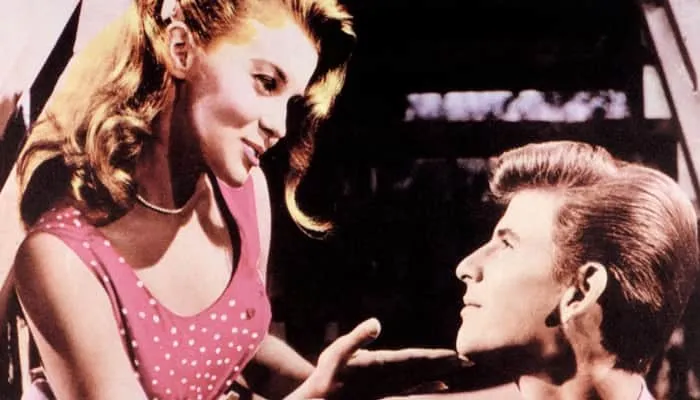Bobby Rydell, the epitome of the early ’60s “teen idol,” who parlayed that fame into a starring role opposite Ann-Margret in the 1963 film “Bye Bye Birdie,” died today at age 79. The cause of death was pneumonia. His death just days away from his 80th birthday was confirmed by radio legend Jerry Blavat, Rydell’s longtime friend from the singer’s South Philadelphia stomping grounds. “Out of all the kids” from that era, Blavat said, “he had the best pipes and was the greatest entertainer. He told the best stories, did the best impersonations and was the nicest guy.”

Rydell’s fame as the epitome of an American teen pop star in the days just prior to rock’s British Invasion was such that Rydell High School in the Broadway musical and subsequent film “Grease” was named after him. An actor also portrayed him in a performance scene in the film “Green Book.”
“It was so nice to know that the high school [in ‘Grease’] was named after me,” he said. “And I said, ‘Why me?’ It could have been Anka High, Presley High, Everly High, Fabian High, Avalon High. And they came up with Rydell High, and once again, total honor.”
The singer had 34 singles chart on the Billboard Hot 100, the most well-remembered of which include “Wild One,” which reached No. 2, and “Volare,” a No. 4 hit. Other top 10 songs included “Swingin’ School,” “The Cha-Cha-Cha.” His run of top 10 songs began with “We Got Love,” which reached No. 6 in 1959, and ended with “Forget Him” in 1964.

By 1961, when Rydell performed a show at the Copacabana in New York City in 1961, Rydell became the youngest performer to ever headline at the famed nightclub, therefore cementing his status with Rat Pack fans as well as teen crowds (In 1961, he also appeared at the Festival du Rock, at the Palais des Sports de Paris in Paris, France, which cemented his relationship with European and British audiences for whom he would headline cabaret gigs through to the present).
In 1963, he played the role of Hugo Peabody in the film version of the satirical musical “Bye Bye Birdie” with Ann-Margret and Dick Van Dyke. His part was not that of the titular rock star, but the jealous boyfriend of the girl who wins a chance to meet Birdie before he joins the Army. In 2011, “Bye Bye Birdie” received a digital restoration, and Rydell appeared with Ann-Margret at a special Academy screening at the Samuel Goldwyn Theater (see video below).

By the next year, Rydell would leave Cameo-Parkway Records for Capitol Records, the same label that his soon-to-be rivals in the Beatles appeared.
In the late ’60s, he moved to Reprise, where he found little success. “Mr. Sinatra wanted me on his Reprise label, so, of course I said yes, but there was no promotion,” Rydell told Goldmine.

